Elevate Your Home’s First Impression: A Comprehensive Guide to Foyer Area Design.

Table of Contents
The adage “you never get a second chance to make a first impression” couldn’t be more accurate than in the foyer of your home.
As the gateway to your personal sanctuary, the foyer sets the tone for the entire living space, welcoming both you and your guests with open arms.
So why settle for a lackluster entryway when you can create a captivating experience right from the moment you step inside?
In this comprehensive guide to foyer area design, we invite you to explore every aspect of foyer area design, from the layout and architectural features to the colors, furniture, lighting, and décor choices that can elevate your home’s first impression.
Whether you reside in a cozy cottage, a sleek modern abode, or an eclectic haven, this guide will equip you with the knowledge and inspiration needed to design a foyer that truly reflects your individuality.
So, let’s embark on this exciting journey together and discover how to create a foyer that leaves an indelible mark on everyone who crosses its threshold.
Understanding the Foyer Area.

Understanding the foyer area is key to designing a space that captures your desired aesthetic and creates a warm welcome for both you and your guests.
When designing your foyer, take into account its size, layout, and architectural elements.
These factors will influence furniture choices and the overall flow of the space.
For example, a small foyer may require space-saving solutions, while a grand entrance can accommodate statement pieces.

Architectural features like high ceilings or unique doorways can be highlighted to add character and elegance to the area.

Embrace natural light by maximizing windows or incorporating glass elements.
By defining its purpose, considering size and layout, and prioritizing natural and artificial lighting, you can create a foyer that reflects your personal style while making a memorable first impression.
Key Elements for foyer area design.
Foyer area design encompasses a harmonious blend of five essential elements:
I. Setting the Mood with Colors and Materials

When it comes to designing an exceptional foyer, the key lies in carefully selecting the perfect combination of colors and materials for the floors, walls, and ceiling.
A. Foyer Area Floor Design
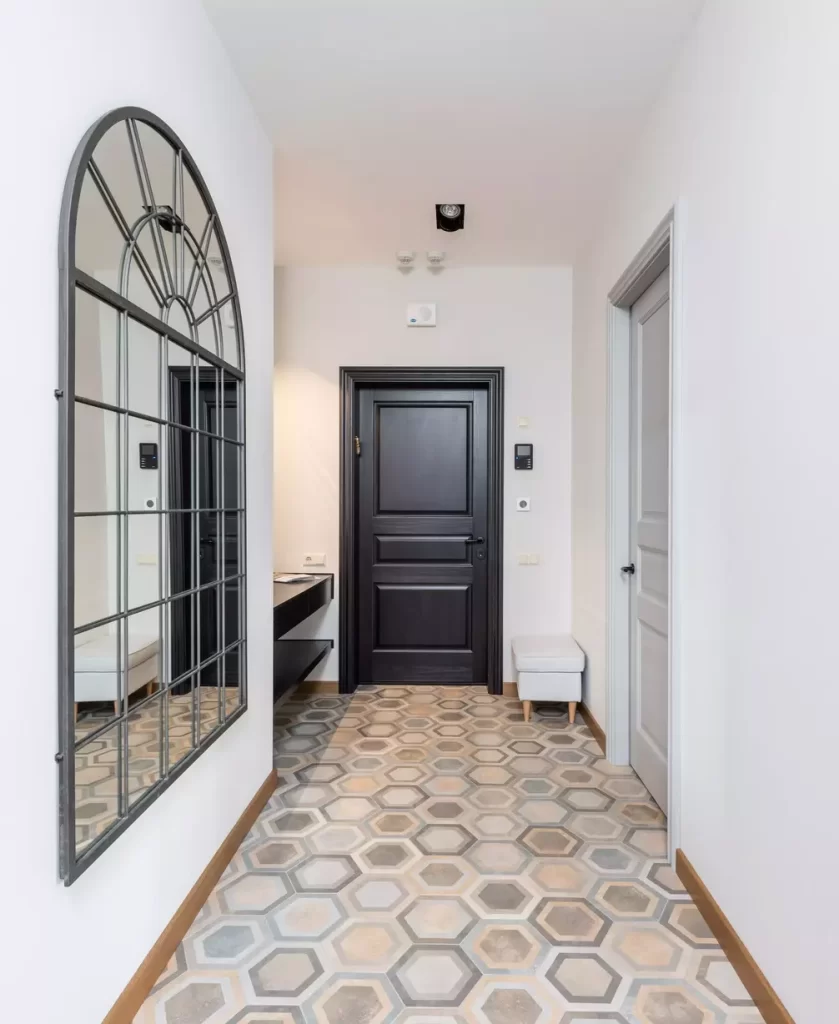
The floor is the foundation of your foyer area design, setting the stage for the entire space.
When choosing flooring materials, consider durability, style, and maintenance.

For a timeless and elegant look, hardwood floors in rich tones like oak or walnut can create a warm and inviting atmosphere.

If you prefer a more modern or minimalist aesthetic, sleek and polished stone or tile flooring can provide a clean and sophisticated appearance.
Remember to select flooring materials that can withstand high foot traffic and are easy to clean and maintain.
B. Foyer Area Walls Design:

The walls of your foyer present an opportunity to express your personal style and create visual impact.
Opt for colors that complement the overall theme of your home while also reflecting the desired mood in the entryway.
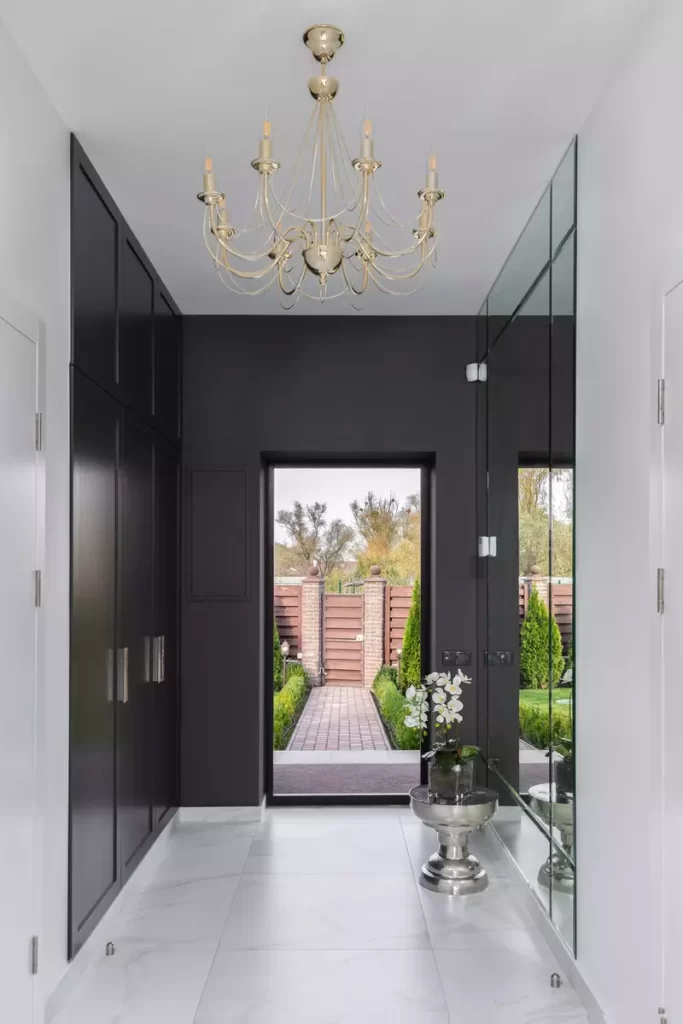
Lighter shades like soft greys or pastels can make a small foyer feel more spacious, while darker hues like deep blues or charcoal can add drama and intimacy to a larger space.
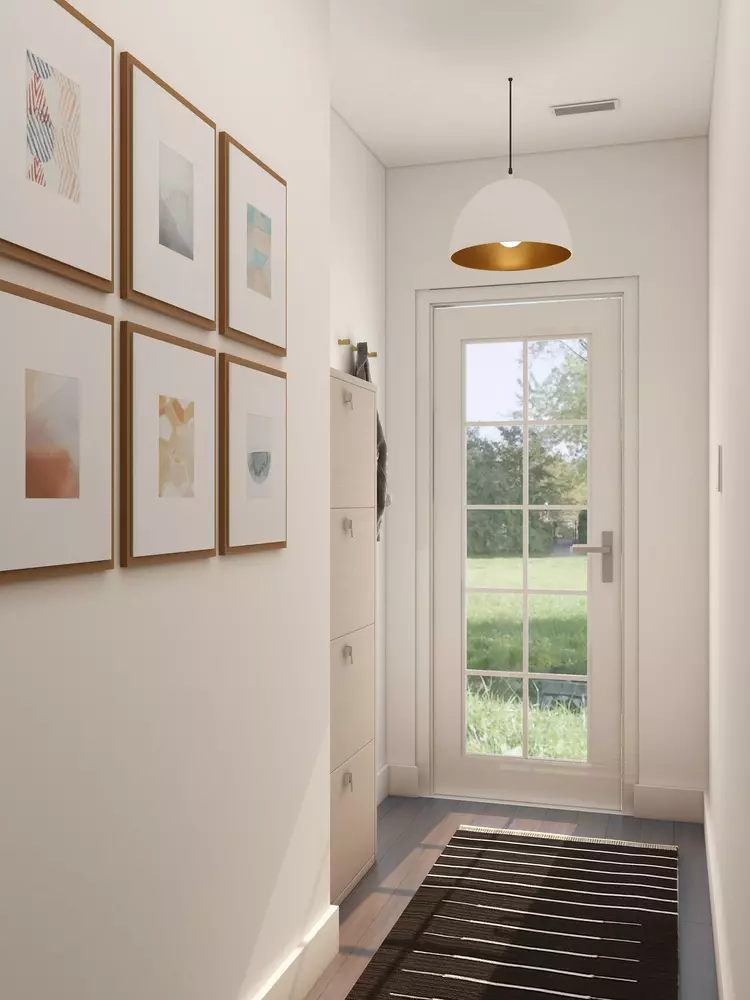
Consider incorporating wall treatments such as textured wallpapers, wainscoting, or decorative molding to add depth and visual interest.
C. Foyer Area Ceiling Design:
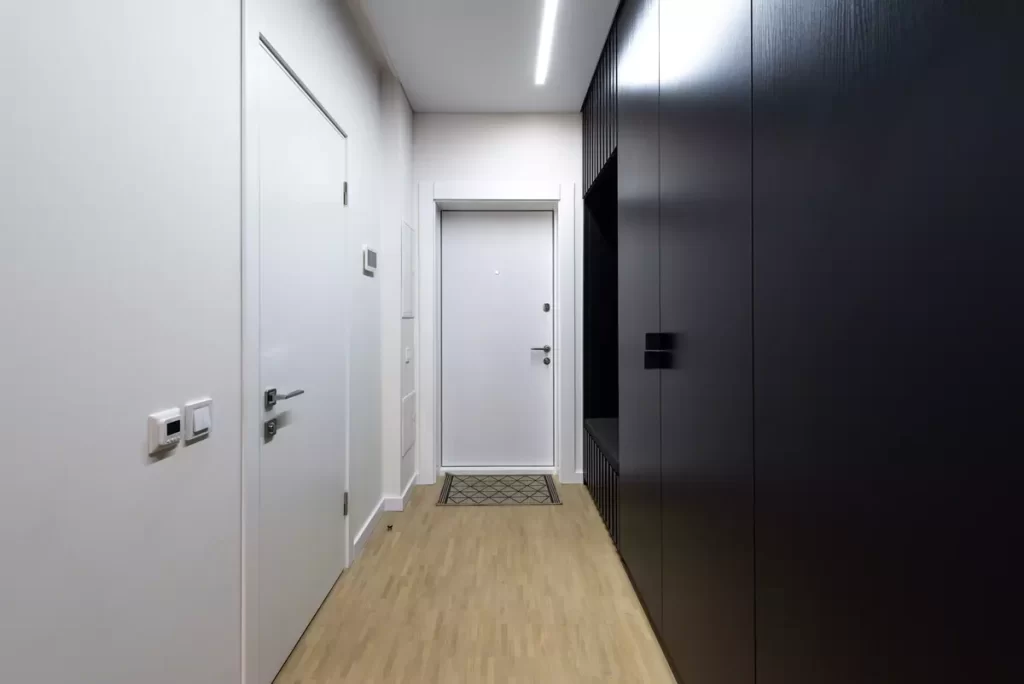
Often overlooked, the ceiling is a vital element that contributes to the overall atmosphere of your foyer.
A simple white ceiling can create a sense of openness and height, while a painted or wallpapered ceiling can add character and personality.
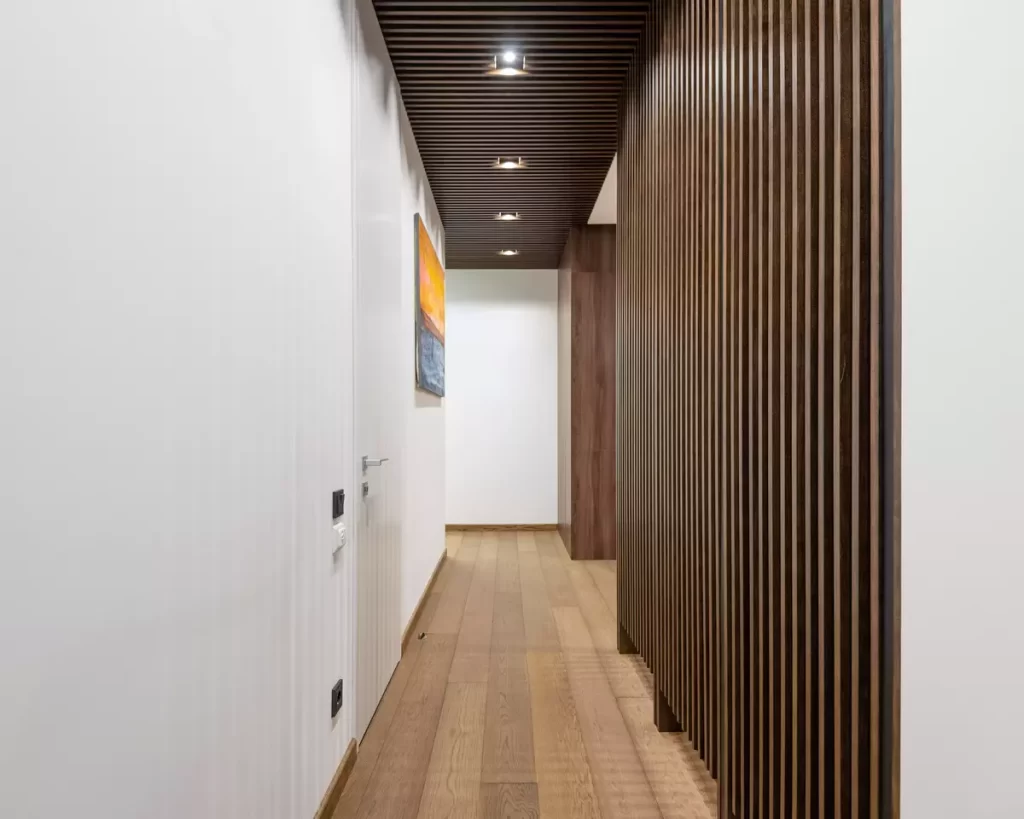
For a touch of elegance, consider adding architectural details like ceiling beams or a coffered design.
Lighting fixtures, such as chandeliers or pendant lights, can serve as focal points and enhance the foyer’s style and ambiance.

By carefully selecting colors and materials for your floors, walls, and ceiling, you can create a cohesive and visually stunning foyer.
Remember to consider the desired mood and style of your space, balancing durability with aesthetics.
For example, pairing dark hardwood floors with light-colored walls and a statement light fixture can create a striking contrast.
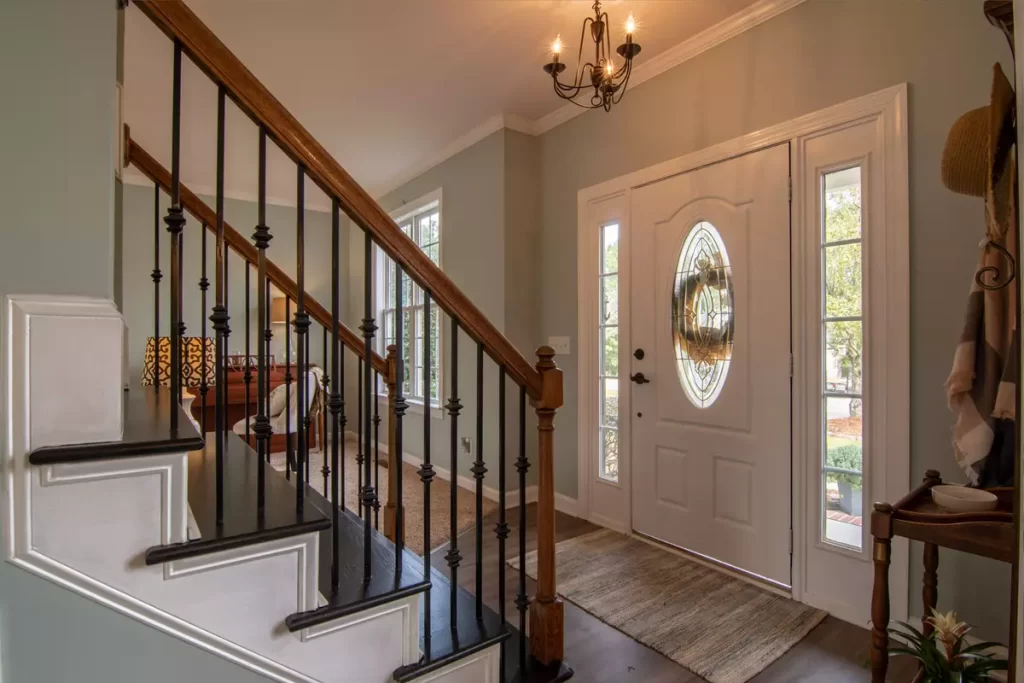
Alternatively, using neutral tiles on the floor, textured wallpaper on the walls, and a subtle ceiling treatment can result in a more understated yet elegant foyer design.

Let your creativity guide you as you bring together these essential elements to craft a foyer that makes a lasting impression.
II. Functional and Stylish Furniture

The furniture you choose for your foyer is not only essential for practicality but also plays a vital role in defining the style and organization of the space.
A. Identifying essential furniture pieces for the foyer:
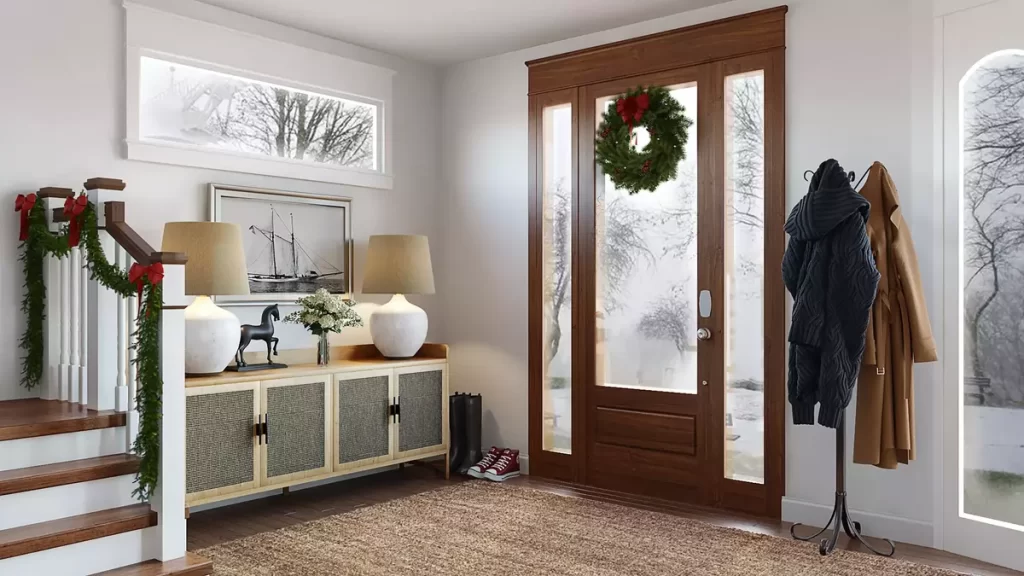
When furnishing your foyer, it’s important to consider both functionality and style.
Start with the essentials, such as a sturdy entryway bench or console table, which provide a convenient spot to sit or place items like keys and bags.
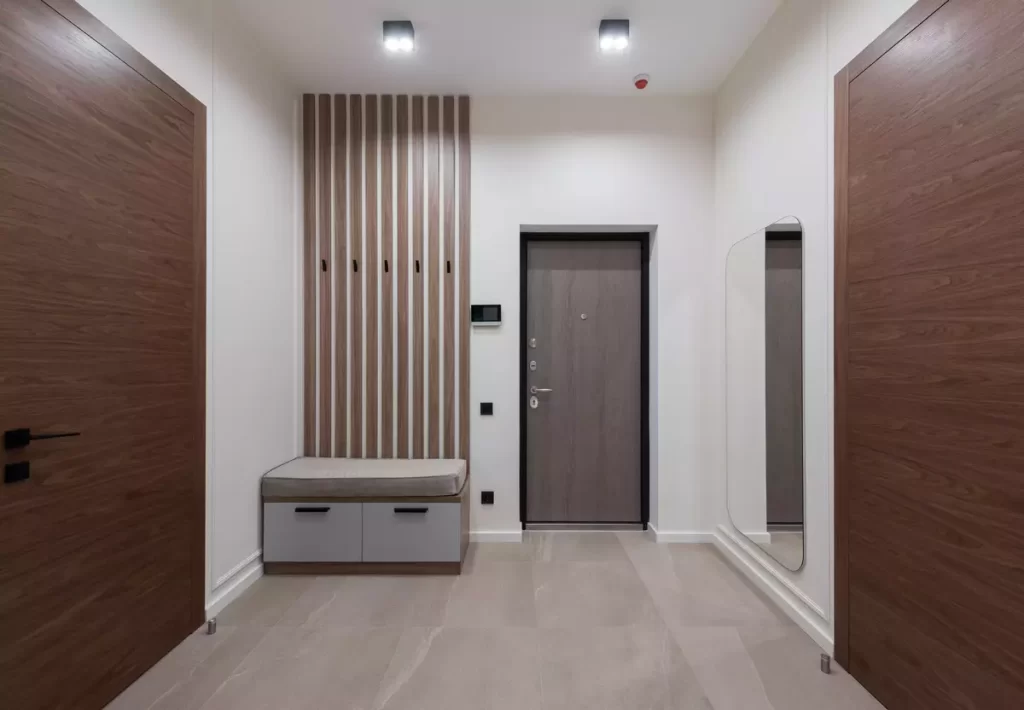
Depending on your needs, you may also want to include a coat rack, umbrella stand, or shoe storage solutions.
These pieces not only enhance the practicality of your foyer but also create a welcoming and organized entry experience.
B. Choosing furniture that matches the style of the home and reflects the homeowner’s personality:
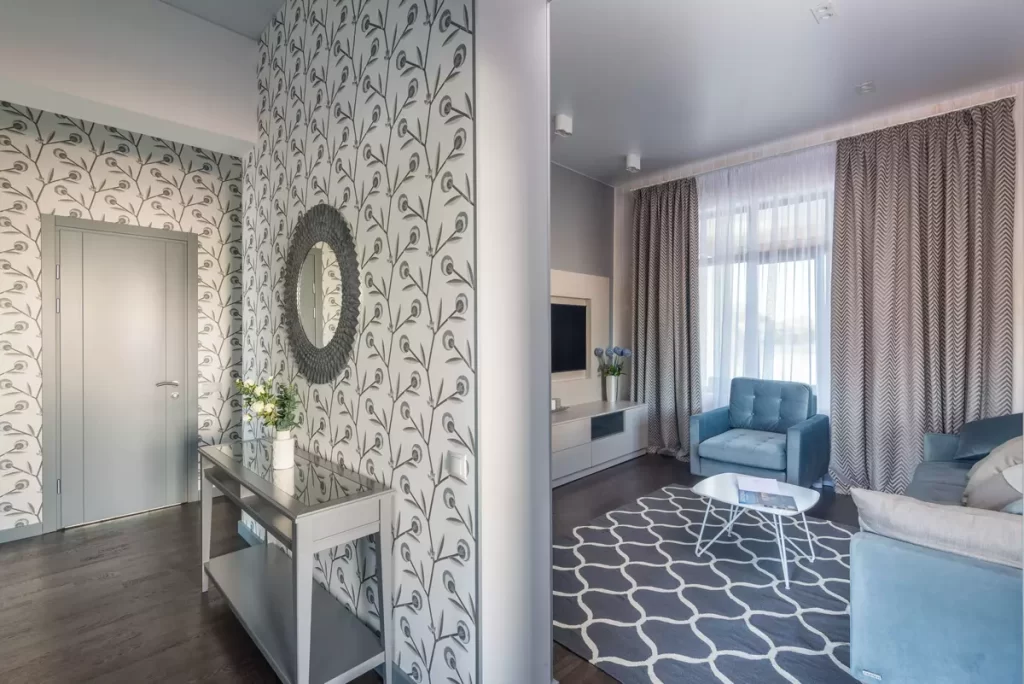
The furniture in your foyer should harmonize with the overall style of your home while also showcasing your unique personality.
For instance, in a farmhouse-style home, a rustic wooden bench with woven baskets underneath can add a charming touch.

In a modern or minimalist space, sleek and streamlined furniture with clean lines and neutral tones can create a contemporary look.
C. Maximizing storage options to keep the foyer area clutter-free:

An organized foyer is essential for maintaining a tidy and welcoming entrance.
Look for furniture pieces that offer storage solutions to help keep the area clutter-free.
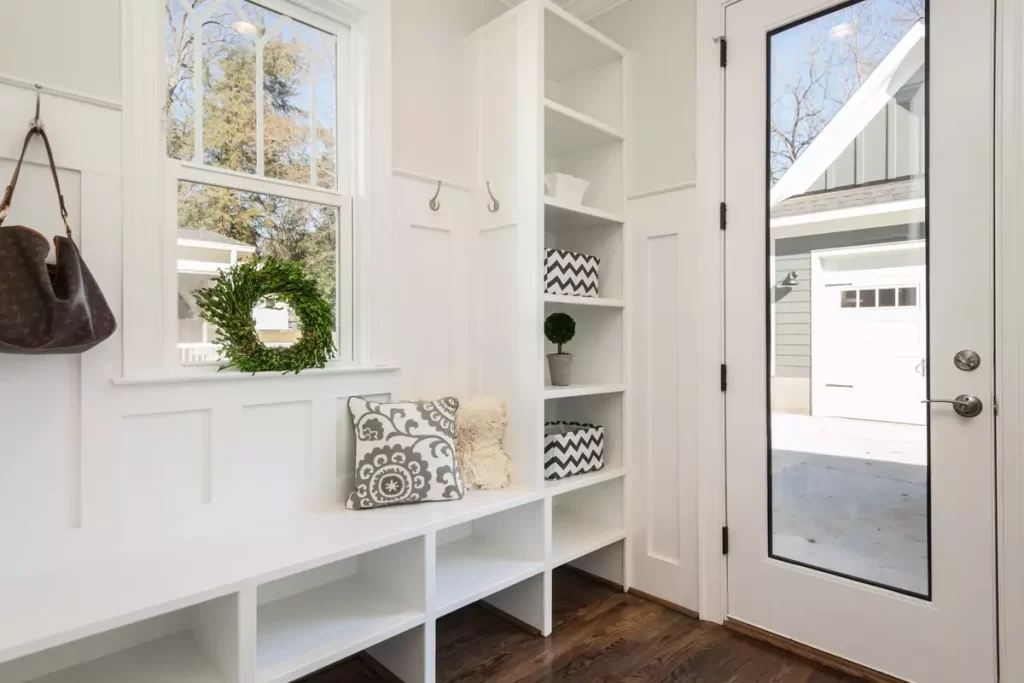
For example, an entryway bench with built-in cubbies or drawers can store shoes, while a console table with shelves or cabinets can house bags, keys, and other essentials.
Wall-mounted hooks or a coat rack provide a designated place for jackets and outerwear.
By optimizing storage options, you can create a functional foyer that maintains its aesthetic appeal.
Remember that the furniture you choose for your foyer should strike a balance between practicality and style.
By identifying the essential pieces, selecting furniture that complements your home’s style, and maximizing storage options, you can create a foyer that is both functional and visually appealing.
Let your furniture choices reflect your personal style and enhance the overall of your foyer area design, ensuring it becomes a seamless and inviting transition into your home.
III. Lighting Techniques for the Foyer Area Design
Lighting is a transformative element that can bring your foyer to life, accentuating its architectural features, setting the mood, and ensuring functionality.
A. Highlighting architectural features with accent lighting:

To showcase the unique architectural elements in your foyer, consider incorporating accent lighting.
Use adjustable spotlights or wall sconces to draw attention to features like intricate molding, a grand staircase, or a statement artwork.
By directing focused light onto these elements, you can create visual interest and add depth to the space.
B. Incorporating ambient lighting to create a warm and inviting atmosphere:
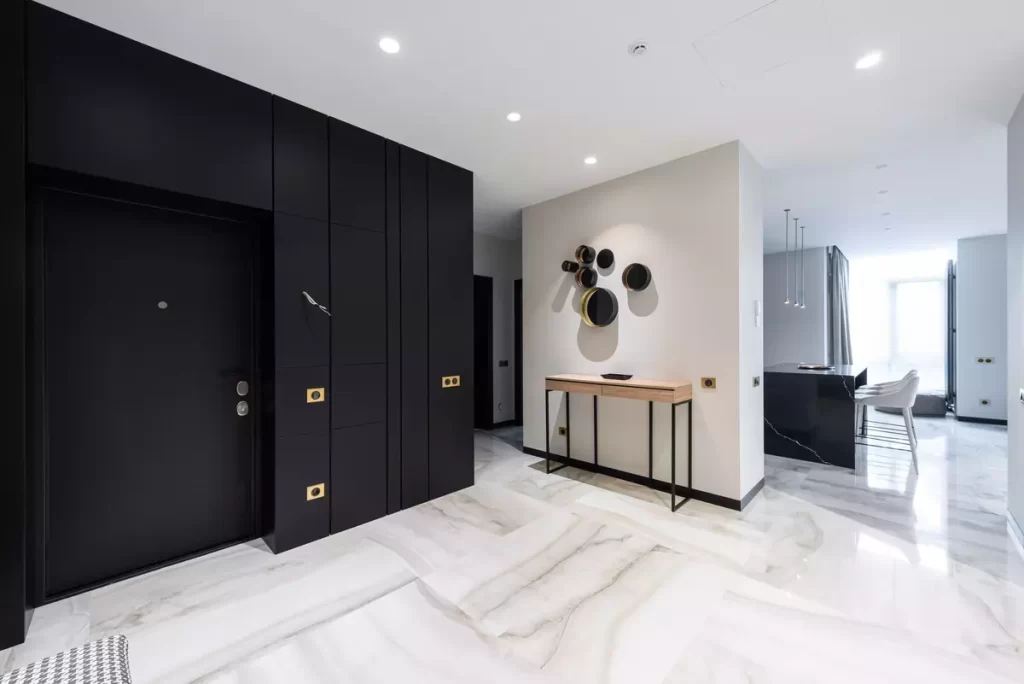
Ambient lighting plays a crucial role in establishing the overall ambiance of your foyer area design.
Soft, diffused lighting can create a warm and inviting atmosphere, making guests feel instantly comfortable.
Install overhead fixtures like chandeliers or pendant lights with dimming capabilities to control the intensity and set the desired mood.
Additionally, wall-mounted fixtures or recessed lighting can help evenly distribute light and eliminate harsh shadows.
C. Utilizing task lighting for functional purposes, such as illuminating key areas and artwork:

Task lighting serves both practical and aesthetic purposes in the foyer area design.
Install wall-mounted or tabletop fixtures to provide focused lighting for specific tasks, such as illuminating a key holder or a decorative vignette.

Consider using picture lights to highlight artwork or photographs, adding an extra layer of visual interest to your foyer.
By strategically incorporating accent lighting to highlight architectural features, utilizing ambient lighting to create a warm and inviting ambiance, and employing task lighting for functional purposes, you can achieve a well-balanced lighting scheme in your foyer area design.
Lighting is a powerful tool that can transform your foyer into a captivating entryway.
By carefully considering the different lighting techniques and incorporating them thoughtfully, you can create a warm and welcoming atmosphere that leaves a memorable impression on anyone who walks through your front door.
IV. Décor and Accessories to Enhance Foyer Area Design.
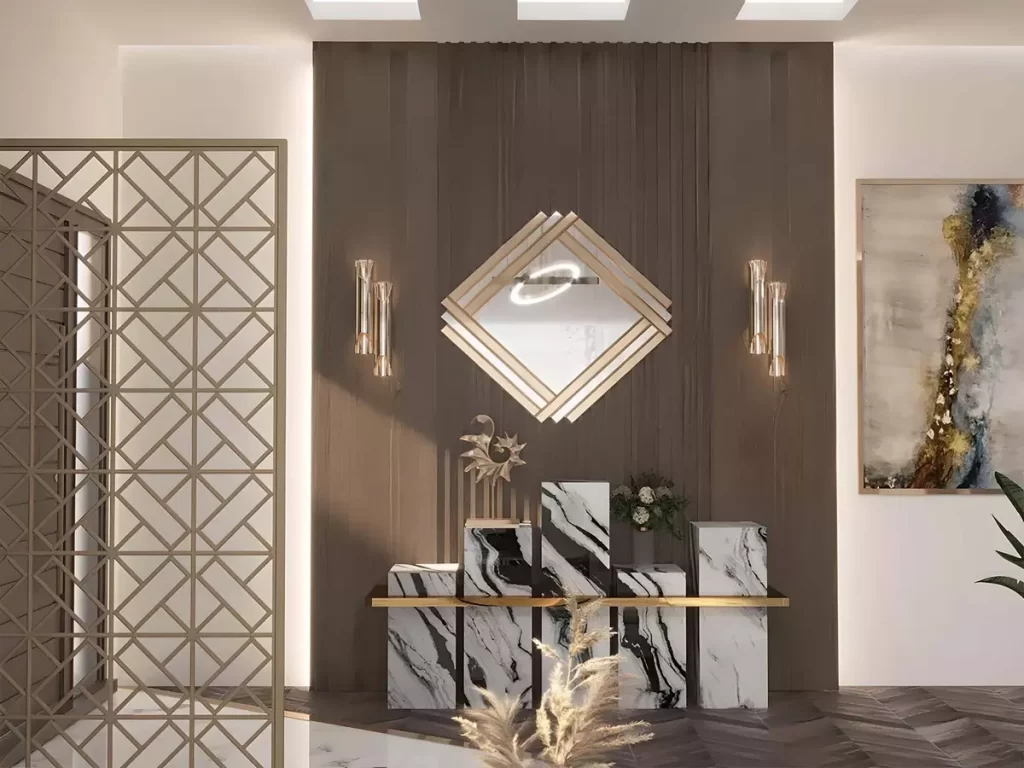
The foyer serves as a canvas for expressing your personal style and infusing it with warmth and personality.
By carefully selecting décor and accessories, you can elevate the visual appeal of your foyer and create a welcoming atmosphere that reflects your unique taste and charm.
A. Selecting appropriate artwork and mirrors for visual interest and reflection:

Artwork and mirrors are powerful additions that can enhance the aesthetic appeal of your foyer area design.
Choose artwork that complements the style and color scheme of the space, whether it’s a vibrant abstract piece or a serene landscape.
Mirrors not only add visual interest but also create an illusion of space and reflect natural light, making your foyer appear larger and more inviting.
B. Incorporating decorative elements like plants, vases, or sculptures to add personality:

Adding decorative elements can breathe life and personality into your foyer area design.
Consider incorporating indoor plants to bring a touch of nature and freshness to the space.
Decorative vases filled with fresh flowers or sculptural elements can serve as focal points and add a sense of elegance and sophistication.
Choose items that resonate with your style, whether it’s a sleek and modern sculpture or a vintage-inspired vase.
C. The importance of seasonal and holiday decorations to keep the foyer area design fresh and festive:
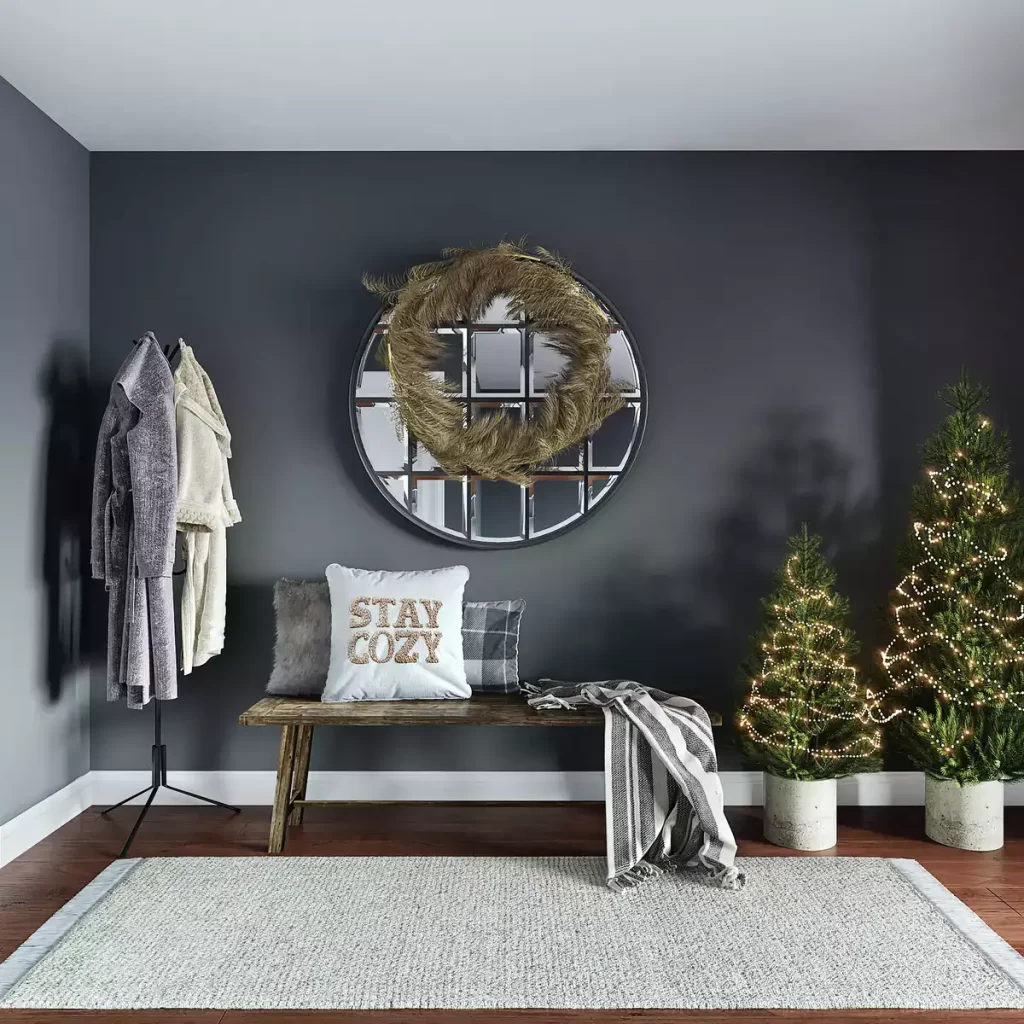
Embrace the changing seasons and celebrate holidays by incorporating seasonal and holiday decorations in your foyer.
Swap out artwork for festive prints or hang a wreath on the door to greet guests.
Consider incorporating seasonal elements like pumpkins for fall, twinkling lights for the holidays, Christmas trees, or fresh blooms for spring.
These temporary additions infuse your foyer with a sense of joy and make it feel constantly refreshed and welcoming.
By selecting appropriate artwork and mirrors, incorporating decorative elements that reflect your personality, and embracing seasonal and holiday decorations, you can transform your foyer into a captivating and dynamic space.
The décor and accessories in your foyer serve as the finishing touches, allowing you to personalize the space and create a warm and inviting atmosphere.
V. Creating an Exterior Welcoming Entrance
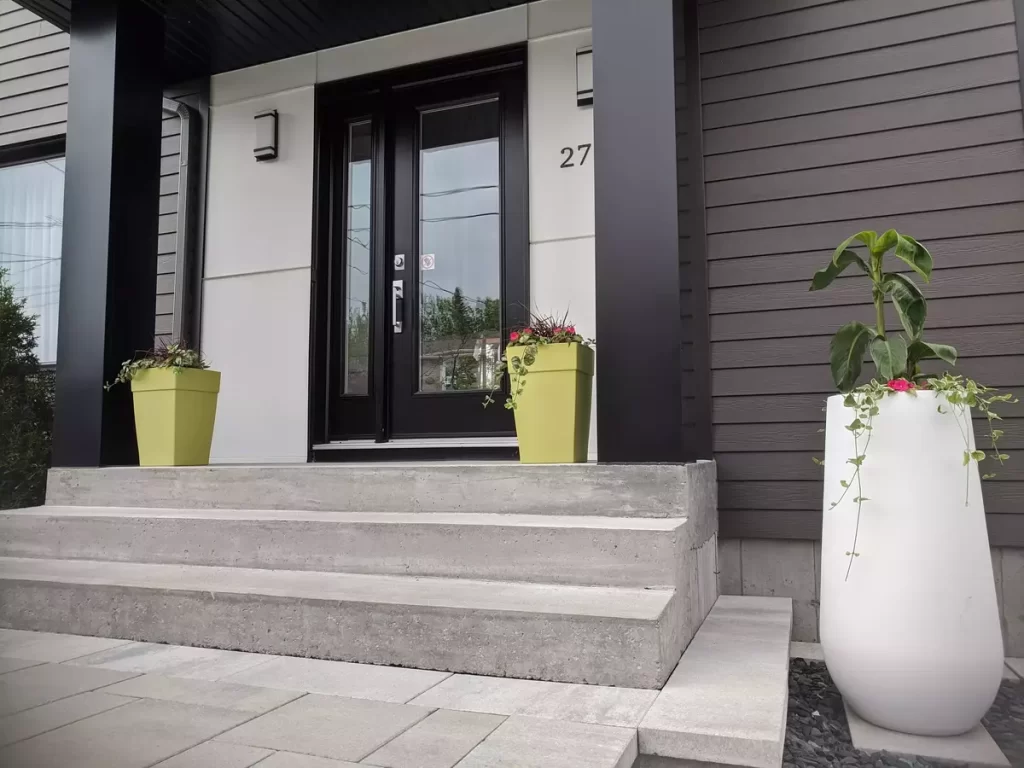
The exterior elements of your foyer, including entryway landscaping, the design of the entry door, and personalized touches, play a crucial role in completing the overall foyer area design and creating a welcoming entrance for your guests.
A. The role of entryway landscaping in enhancing the overall appeal of the foyer:
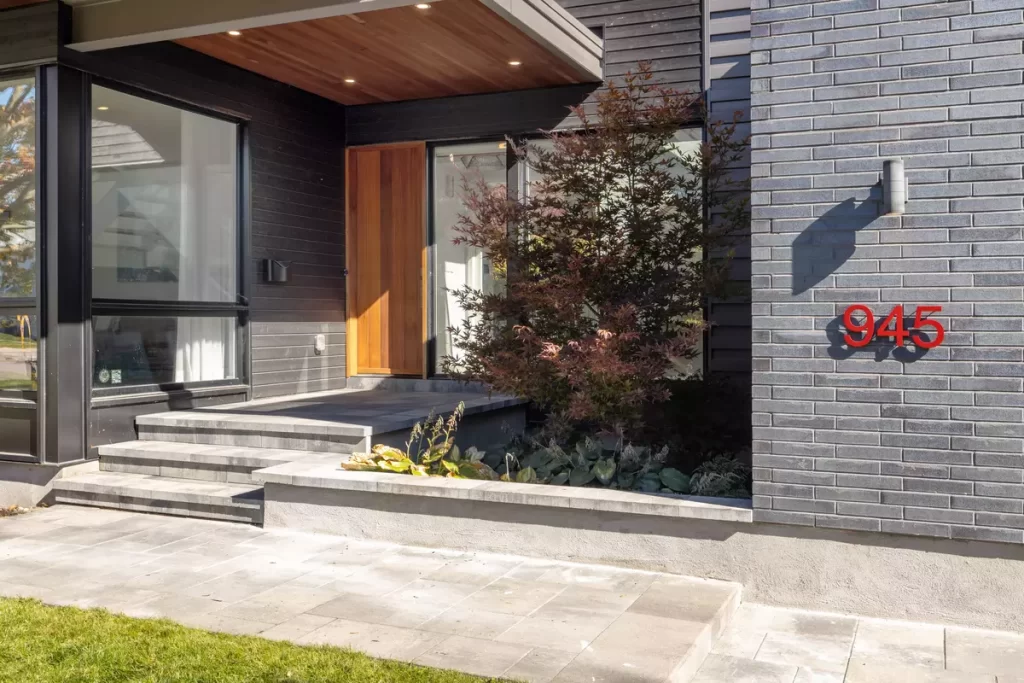
Don’t forget to extend your foyer area design to the outdoors by considering entryway landscaping.
Well-placed plants, flowers, and shrubs can create a seamless transition from the exterior to the interior, enhancing the curb appeal and setting a positive first impression.
Choose plants that thrive in your climate and complement the style of your home.
Consider adding decorative elements like garden lighting or pathway materials to guide guests toward your welcoming entrance.
B. Welcoming guests with a thoughtfully designed entry door and hardware:

The entry door is the gateway to your home and should make a statement.
Choose a door design that reflects the style of your home, whether it’s a classic wooden door, a sleek and modern design, or an ornate ironwork door.
Pay attention to the hardware, such as doorknobs and knockers, as they can add a touch of elegance or personality.
Ensure the door is in good condition, properly sealed, and painted or stained in a color that complements your overall foyer area design.
C. Adding personal touches, such as a doormat or signage, to make guests feel invited:

Personal touches can truly make your guests feel welcomed as they step into your foyer.
Place a doormat that complements your style and adds a warm and inviting touch.
Consider customizing it with a monogram or a friendly message.
Additionally, adding signage with your family name or a welcoming phrase can further enhance the inviting atmosphere.
These small details create a sense of hospitality and make your guests feel valued and appreciated.
Remember that the exterior elements of your foyer contribute to the overall impression of your home.
By considering the role of entryway landscaping, ensuring a thoughtfully designed entry door and hardware, and adding personal touches like doormats and signage, you can complete the transformation of your foyer into a truly welcoming space.
Small Foyer Area Design
Small foyers can present a unique design challenge, but with some creativity and strategic planning, you can make the most of the available space while maintaining functionality and style.
By implementing clever storage solutions, utilizing multifunctional furniture, and employing design strategies that create an illusion of spaciousness, you can transform a compact foyer into a functional and visually appealing entryway.
A. Creative solutions for maximizing storage in compact foyers:
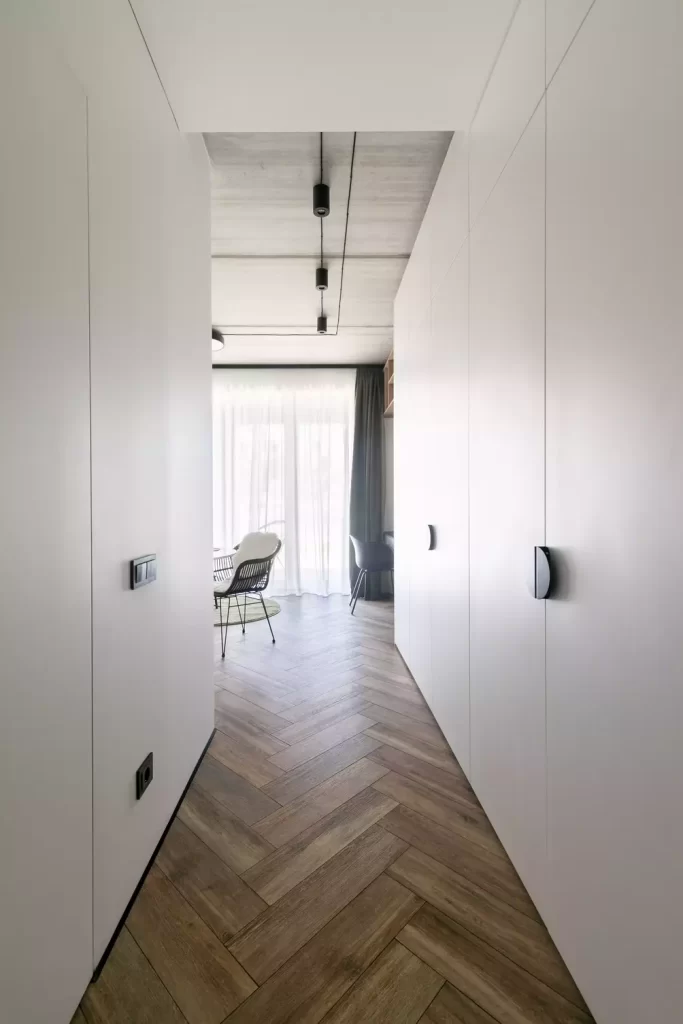
In small foyers, storage becomes even more crucial to keep the space organized and clutter-free.
Look for innovative storage solutions such as wall-mounted shelves, floating cabinets, or built-in cubbies to maximize vertical space.
Utilize the area underneath a bench or console table for additional storage by incorporating baskets or drawers.
Hooks or pegboards on the wall can provide a place to hang coats, bags, and keys.
By utilizing every inch of available space, you can ensure that your small foyer remains tidy and functional.
B. Utilizing multifunctional furniture and built-in features:

Multifunctional furniture is a game-changer in small foyers.
Consider a bench or console table with built-in storage compartments to store shoes, hats, or scarves.
Opt for furniture pieces that serve multiple purposes, such as a mirror that also acts as a coat rack or a console table with a fold-down desk for occasional use.

Built-in features like wall-mounted folding chairs or pull-out drawers can save space while providing additional functionality.
By choosing versatile furniture and incorporating built-in elements, you can optimize the functionality of your small foyer.
C. Design strategies to make a small foyer appear more spacious:

Design choices can significantly impact the perceived size of a small foyer.

Start by keeping the color palette light and neutral, as this creates an illusion of openness and airiness.
Opt for mirrors or reflective surfaces to bounce natural light and make the space appear larger.

Choose furniture with sleek lines and open designs to create a sense of visual transparency.
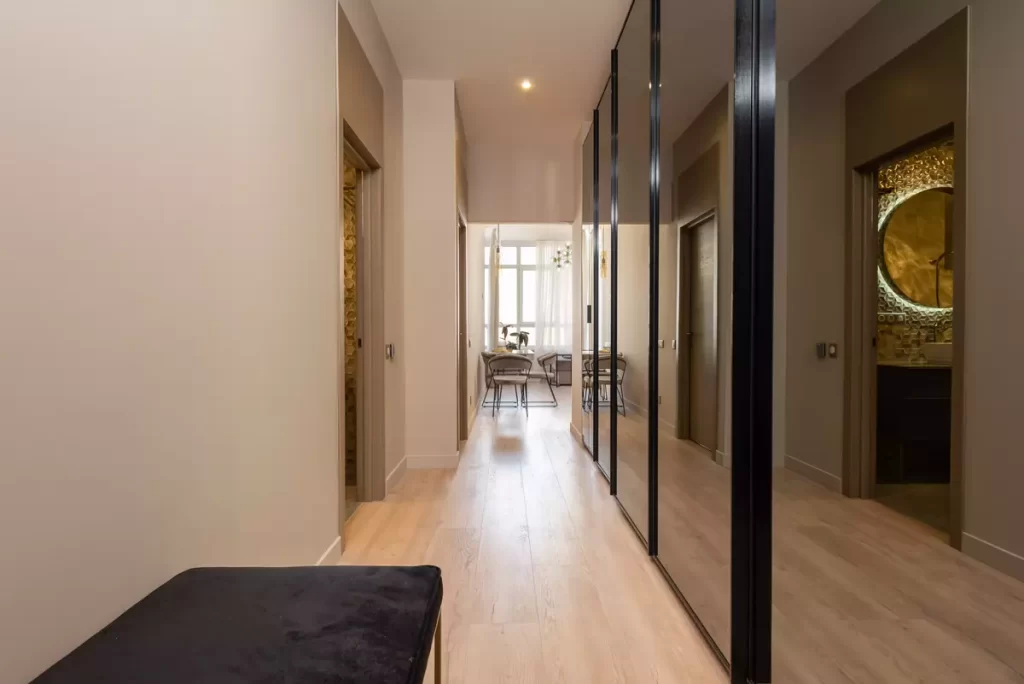
Minimize clutter and keep the space visually uncluttered by selecting a few carefully curated decor pieces.
By implementing these design strategies, you can visually expand the space and create a more spacious feel.

In small foyers, every inch of space counts.
By applying these techniques and customizing them to suit your specific needs, you can transform your compact foyer into an efficient and inviting entryway that makes the most of its limited space.
In conclusion, a foyer area design that leaves a lasting impression involves considering various elements, from the layout and architectural features to the furniture, lighting, décor, and even the exterior elements.
Throughout this article, we have explored key aspects such as color schemes, materials, storage solutions, lighting techniques, and optimizing space in small foyers.
By following this comprehensive guide to foyer area design, you’ll be able to transform your home’s entryway into a stunning space that sets the stage for a memorable and inviting living experience.
Investing in a well-designed foyer is crucial as it sets the tone for your entire home and creates a welcoming atmosphere for both residents and guests.
Take a moment today to evaluate your foyer area design and consider the key points discussed in this article.
If you’re feeling overwhelmed or unsure about your foyer area design or home, don’t hesitate to reach out to our expert interior design team.
Contact us today and let us guide you through the process of designing a foyer that will leave a lasting impression on all who enter your home.
